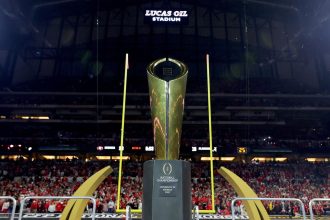Unlock the Editor’s Digest for free
Roula Khalaf, Editor of the FT, selects her favourite stories in this weekly newsletter.
Chris Christie is trying to fend off growing pressure to bow out of the 2024 White House race and narrow the field of candidates challenging Donald Trump for the Republican presidential nomination.
The former governor of New Jersey has cast himself as the most outspoken critic of ex-president Trump in the Republican primary campaign, but has failed to gain traction in national polling with less than two months before the first ballots are cast in the Iowa caucuses.
Whereas Mike Pence, the former vice-president, and Tim Scott, the South Carolina senator, have halted their campaigns after struggling to win sufficient backing, Christie is continuing to run and is aiming to participate in the next Republican debate in Alabama in early December.
Christie supporters say it is crucial for him to stay in the race because he offers the clearest contrast to Trump, he is performing reasonably well in New Hampshire, one of the early primary voting states, and he is strong on foreign policy during a time of international turmoil.
But detractors say Christie’s enduring presence in the Republican field is making it harder for the party to coalesce around one or two viable alternatives to Trump.
“All the fundamentals related to Christie’s candidacy are pointing in the wrong direction,” said Kevin Madden, a Republican strategist at Penta Group in Washington and former aide to Mitt Romney’s 2012 presidential campaign.
“His most potent profile right now will be one of a spoiler, preventing Nikki Haley from consolidating support and getting into a one on one contest with Donald Trump,” Madden added.
Christie is not only trailing Ron DeSantis, the Florida governor, in the 538.com polling average, but is also behind Haley, the former US ambassador to the UN and former South Carolina governor, who has been gaining momentum in the race.
Last week, Maria Comella, a Christie adviser, fired off a memo to “interested parties” arguing further consolidation would only help Trump because no one else was willing to attack him directly.
“With Trump the dominant candidate at this stage of the race, we are seeing what isn’t working: Get to Trump’s right, run as a Trump clone, ignore Trump, try to please everyone,” Comella said. “What case against Trump will Haley or DeSantis be able to make were the field to consolidate further, that they can’t make now?”
The Christie campaign has also pointed out that the former New Jersey governor is in a leaner financial position than his other Republican rivals, burning through cash at a daily rate of $15,800, as of data from October 1, compared to $38,000 for Haley and $120,300 for DeSantis.
Christie may also gain some advantage from turmoil in the DeSantis camp. Although the Florida governor picked up two high-profile endorsements recently in Iowa with governor Kim Reynolds and evangelical leader Bob Vander Plaats, NBC reported on rampant infighting between DeSantis’s inner circle and Never Back Down, an outside group supporting him, including heated arguments and tension-filled meetings.
But doubts about the sustainability of Christie’s campaign remain. The former governor is betting a lot of his candidacy on his performance in New Hampshire, where he is in third place behind Trump and Haley.
A recent poll by the Washington Post and Monmouth University showed that while 56 per cent of Republican voters in New Hampshire have a favourable opinion of Haley, just 29 per cent feel the same about Christie.
Michael Strain, of the American Enterprise Institute, a centre-right think-tank in Washington, said he “respected and liked” Christie but a “plain reading of the situation” was that Haley was the most “viable” alternative to Trump.
“If the goal is to knock off president Trump in the early states before Super Tuesday and for somebody other than him to win the nomination, I think governor Haley is the person best positioned to do that. The party needs to take that seriously,” Strain said.
While Christie is campaigning in New Hampshire, he decided on a strategy of not competing in Iowa, where conservative evangelical voters with more hardline social positions than he has on issues such as abortion are more dominant.
While this means Christie will from the outset be catching up to other candidates in the race for delegates and momentum, he is betting that rivals including Haley will be forced to the right in Iowa in a way that will backfire in New Hampshire.
Meanwhile, some of Christie’s backers say that after the Pence and Scott departures, the Republican field is already narrower than it was in 2016, the last time there was a competitive party primary.
“Christie is where he needs to be right now,” said one Christie donor who is sticking by him.
Read the full article here




